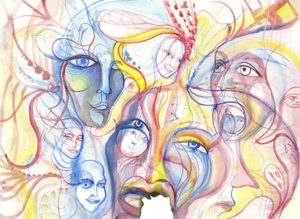Back to series


Recommended Reading:

How We Got the Seven Deadly Sins
Click here to open a Print - Friendly PDF
| If you Google the seven deadly sins today, you’ll come up with websites selling seven deadly sins t-shirts, “flaunt your fatal flaw” color-coded wristbands, a seven deadly sins game telling you to “sin to win,” and a wine named the Seven Deadly Zins (yes, it’s a Zinfandel). In other words, our culture doesn’t often take sin to be much more than a humorous marketing gimmick.
By contrast, the writer of Proverbs comments, For your ways are in full view of the Lord, and he examines all your paths. Sin is apparently its own punishment: we make foolish choices, and those “ways” lead to a kind of enslavement. To put it bluntly, we reap what we sow.
We deceive ourselves about how powerful sin actually is, and when we finally do face our flaws, we often find ourselves, as Augustine said in his Confessions, “chained by the power of habit.” What would it look like to take sin seriously—to acknowledge how susceptible we are to the dark power of our own disordered desires? And what difference does it make to think of sin as self-destructive habit that shapes our lives from the inside out? To address these questions, let’s backtrack from our Google searches about sin and consider the story of a man who learned the answers the hard way. Evagrius of Pontus was a church leader in the fourth century. Born near the Black Sea, he spent his early years mentored and educated by the greatest church leaders of the day—Basil and Gregory Nazianzus, powerful and influential bishops of large cities. And at that time church leadership was also political leadership. His mentors brought him into their inner circle and groomed him for positions of power. Respected and influential by age thirty-five, he was near the apex of professional success. And so, almost inevitably, temptation struck. He fell in love with a married woman. The attraction finally reached a tipping point. The affair—if exposed—would have created scandal in the church and cost him his reputation, irreparably ruining his career and connections in Constantinople. Prompted by a nightmare, which he saw as an angel’s visionary warning, he fled town. In Jerusalem Evagrius went to see monastic leaders named Melania and Rufus. Still battling temptation and longing to return home, he became extremely ill—a physical breakdown and a spiritual crisis all in one. “What have I done? Who have I become? What am I doing with my life?” Melania the Elder saw right through the agony on his face to the condition of his heart. When he confessed, she handed him hard news: there’s no going back to Constantinople for you. With spiritual authority, she sent him off to the monastic training centers in Egypt—like a drug abuser sent to intensive inpatient rehab, like a delinquent sent to military camp. It was time to retrain, recalibrate everything, relearn who he was, and how he should live. In the arid wilderness communities of Egypt, Evagrius was mentored and trained in the ascetic disciplines of the desert fathers. He devoted the rest of his days to the monastic life, becoming an astute student of the heart and its shadow side. Ironically it took time away from his life in the halls of power to understand the real power of sin. But what he learned there about the sin’s disorder and destructive potential is hard-won wisdom still available to those of us in public life today. Imagining Evagrius’s work is like imagining what it would be like to be a chaplain or spiritual mentor for busy professionals such as governmental leaders and entrepreneurs. Imagine such a counselor listening to them all: idealistic rookies and seasoned cynics, those who feel like failures who can’t keep up and those who feel like untouchable successes. At weekly appointments such a counselor listens with discernment and guides them with wise advice. What if you did this with hundreds of people, for decades? At the end of such a vocation, wouldn’t you have seen it all? Picture that counselor chronicling those conversations, identifying familiar patterns of temptation and weakness that emerged from experience and observation, along with insights into which therapies were most effective in helping people deal with their struggles; who among the struggling were most helped and why? That’s a pretty good picture of how the list of the seven deadly sins began more than 1,500 years ago. As an apprentice Evagrius inherited a wealth of experience from his masters in those desert communities of Christian practice. He added his own counsel to their collective wisdom. He meant his list of vices—gluttony, lust, wrath, greed, sloth, envy, vainglory, and pride2—to serve as a helpful rubric that pastorally sensitive spiritual directors could use to help real struggling individuals. It wasn’t a catalog of the “deadliest” sins or the worst crimes against humanity. Just the most familiar, recurring pitfalls everybody deals with sooner or later. His books offered practical wisdom about how to live. The tradition called it “soul care.” They helped articulate besetting problems for those who vaguely knew there was something wrong but couldn’t name or pinpoint the source of their struggle. Think of a patient who goes to the doctor with symptoms of persistent abdominal pain, wondering whether it is simple indigestion or something much more serious. The doctor helps the patient to name the problem. What is the underlying cause of the symptoms? Once we diagnose correctly, of course, we can undertake regimens designed to return us to health. John Cassian, Evagrius’s disciple, said that the vices list was meant to aid our diagnoses of “spiritual maladies” or diseases, which are then brought before Christ, the “Physician of souls,” for healing. Like a diet and exercise regimen designed to lower one’s cholesterol, the very methods used for healing certain maladies also make good preventative care, not only blocking the disease, but also building healthy habits for future well-being.
What are the vices? Anything that systematically gets in the way of our wholehearted love for God. Anything that is a close enough cousin to true human fulfillment to try to build our lives around. Anything that promises us goodness that we can engineer, rather than having to learn to receive it as a gift. It should come as no surprise to anyone what sorts of things will show up on that list—money, security, pleasure, power, status, social approval, the desire to be in control. These temptations are fundamental and perennial. When it comes to following Adam and Eve, we are like a broken record. So it’s not surprising that there is a lot from desert practice that translates well into our contemporary context. Take the vice of vainglory, for example. This particular item of the list of vices has fallen out of our current vocabulary. But the desert fathers knew that the desire for attention and affirmation from others around us could eventually get twisted from even the best motives into self-serving narcissism. Even if you start out caring about maintaining the good—Christian sanctity or virtue, excellence in your work or ministry, faithfulness in your service to the world—once you are noticed for these good things, the publicity can go to your head. In an age of Facebook, is there anything about ourselves that isn’t on display for public approval? How do the habits of self-display form our hearts and train our loves? John Cassian, Evagrius’s disciple, told a story of a monk who so longed to be known for his eloquence and sanctity that he found himself preaching out loud to an imaginary congregation—in the solitude of his desert cell. Telling glory stories of our high school athletic feats, bragging about sexual exploits in the locker room, spending billions annually on cosmetics, fashions, hair products, and plastic surgery, driving the right cars, choosing the right careers, bragging of our life’s milestones and résumé lines, putting stickers about our children’s elite teams on the backs of our cars: like Gaston in Beauty and the Beast, we have made a lifestyle out of being stroked for the self-image we carefully cultivate. It is not hard to imagine the diagnostic power of a concept like vainglory in a world of Twitter and YouTube. Even in our church lives, we want not just to be, but to be known as Good, Respectable Christians, devoted to well-approved ministries. Harder to imagine, perhaps, is what the regular practice of spiritual disciplines such as silence or solitude would do to shake us to our senses, if not push back against the darkness. How much of our conversation is devoted to self-advertisement, self-justification, self-promotion? Are we truly encouraging others or playing a subtle game of envious one-upmanship? What would it be like to spend a day in a posture of welcoming reception and attentive listening? What would it be like to lay down our performances for all the audiences around us? Do we know what it is to stand firm in the unconditional love of God and maintain our equanimity against false flattery and even the scorn of others? Vainglory is one of those insidious habits that unconsciously shapes our lives. If we are unintentional about discipleship, it is all too easy to get sucked in and then discover that we are too far gone to find a way back. The spiritual disciplines are practices of resistance against sin, but, more important, they give us patterns of life that bring us back to spiritual health and well-being. Thankfully, we don’t have to take advice on how to handle temptations like vainglory from some otherworldly saints we can’t relate to. Evagrius was someone who wrestled, who suffered, who made mistakes, who needed serious rehabilitation and treatment. He knew what temptation feels like—how people are seduced and slip and fall. Precisely for that reason, he can invite us to learn what his own hard-won transformation taught him. We should also notice that Evagrius’s story is the story of a transforming community. Discernment and discipleship in the desert were the work of a worshiping, practicing Christian community, not the heroic efforts of an individual. The insights Evagrius records are the summation of a whole monastic movement’s way of life. Evagrius began his Egyptian sojourn, like his ascendancy to a position of influence in Constantinople, by joining a community, complete with spiritual directors and mentors and supporters. When it comes to matters of the heart, Christians need each other. Communal enterprises such as athletic teams and musical ensembles are good metaphors for disciples of Jesus, for we are not isolated individuals but part of the body of Christ. For example, thinking of Christian discipleship as a social enterprise shifts our focus from vainglory as a purely individual problem to the way vices are communally fostered and communally resisted. Vainglory, while certainly a personal spiritual problem, also warps social structures and does institutional damage in society and culture. As a counterpoint, however, creating a culture of “good glory”—a way of affirming and encouraging one another in goodness that is a beautiful witness and a light shining in the darkness—is something that also requires a communal effort. We will need not only people with integrity and good character in the limelight, but also a good audience to support them and celebrate their gifts—an audience that knows glory is rightly rendered ultimately to God. Evagrius and the Christian tradition after him teach us how to use the seven deadly sins as a tool of self-examination, designed to lead us from repentance to regeneration. But the focus should not, finally, be on sin—whether vainglory or any of the others. After all, God used Evagrius’s downfall to bring him new life, even into the desert. God can break the power of sin in all of us, and if we remain in the true Vine, we will bear much godly fruit, showing ourselves to be his disciples. Frederick Buechner once defined Christian saints as those who, when we are with them, make us feel more alive. It is ironic, perhaps, that a study of sin can be a first step toward freedom, and that knowing the power of such self-destroying habits can be a gateway to the grace of abundant life. Evagrius wrote to tell us that truth but, more important, to show us how to live it. |
|||
| Notes: 1. N.T. Wright, Following Jesus: Reflections on Discipleship (Grand Rapids: Eerdmans, 1994), 89. 2. Evagrius’s list of eight has been variously modified over the centuries, now generally known as a list of seven, vainglory usually being assumed into the larger category of pride. |
|||

Rebecca DeYoung
ProfessorRebecca DeYoung, Professor of Philosophy at Calvin College in Michigan, where she has taught since 1998. She received her MA and PhD from the University of Notre Dame and specializes in research about the seven deadly sins and spiritual formation. She speaks on moral and spiritual life, has authored several books including Glittering Vices, Aquinas’ Ethics and Vainglory.

Recommended Reading:
Glittering Vices: A New Look at the Seven Deadly Sins and Their Remedies, by Rebecca Konyndyk DeYoung, Brazos Press
 Contemporary culture trivializes the “seven deadly sins,” or vices, as if they have no serious moral or spiritual implications. Glittering Vices clears this misconception by exploring the traditional meanings of gluttony, sloth, lust, and others. It offers a brief history of how the vices were compiled and an eye opening explication of how each sin manifests itself in various destructive behaviors.
Contemporary culture trivializes the “seven deadly sins,” or vices, as if they have no serious moral or spiritual implications. Glittering Vices clears this misconception by exploring the traditional meanings of gluttony, sloth, lust, and others. It offers a brief history of how the vices were compiled and an eye opening explication of how each sin manifests itself in various destructive behaviors.
Readers gain practical understanding of how the vices shape our culture today and how to correctly identify and eliminate the deeply rooted patterns of sin that are work in their own lives. This accessible book is essential for any reader interested in spiritual disciplines and character formation.
Excerpt: Very simply, a virtue (or vice) is acquired through practice repeated activity that increases our proficiency at the activity and gradually forms our character. . . . We often need external incentives and sanctions to get us through the initial stages of the process, when our old, entrenched desires still pull us toward the opposite behavior. But with encouragement, discipline, and often a role model or mentor, practice can make things feel more natural and enjoyable as we gradually develop the internal values and desires corresponding to our outward behavior. Virtue often develops, that is, from the outside in. This is why, when we want to reform our character from vice to virtue, we often need to practice and persevere in regular spiritual disciplines and formational practices for a lengthy period of time.
 COPYRIGHT: This publication is published by C.S. Lewis Institute; 8001 Braddock Road, Suite 301; Springfield, VA 22151. Portions of the publication may be reproduced for noncommercial, local church or ministry use without prior permission. Electronic copies of the PDF files may be duplicated and transmitted via e-mail for personal and church use. Articles may not be modified without prior written permission of the Institute. For questions, contact the Institute: 703.914.5602 or email us.
COPYRIGHT: This publication is published by C.S. Lewis Institute; 8001 Braddock Road, Suite 301; Springfield, VA 22151. Portions of the publication may be reproduced for noncommercial, local church or ministry use without prior permission. Electronic copies of the PDF files may be duplicated and transmitted via e-mail for personal and church use. Articles may not be modified without prior written permission of the Institute. For questions, contact the Institute: 703.914.5602 or email us.
-
Recent Podcasts
From Politics to Pampers
by Michelle Morgan Knott, Aimee Riegert on November 15, 2024A stay-at-home mom shares life and spiritual lessons...Read More
-
An Unexpected Change – David Westerhoff’s Story
by David Westerhoff on November 8, 2024
-
The Faith of Jonathan Edwards
by Aimee Riegert, Arthur W. Lindsley on November 1, 2024
-
Recent Publications
Will You Be Ready?
by Thomas A. Tarrants on October 23, 2024Tom Tarrants gives insights on how we can...Read More
-
Should Christians Be Involved with Politics?
by Kerry A. Knott on October 1, 2024
-
Isn ’t Atheism Based on Scientific Fact Whereas Christianity is Based on “Faith”?
by Cameron McAllister on September 1, 2024
0
All Booked
0.00
All Booked
0.00
All Booked
23169
ADVENT CALENDAR: The Amazing Prophecies Fulfilled by the Birth of Jesus Christ
https://www.cslewisinstitute.org/?event=advent-calendar-the-amazing-prophecies-fulfilled-by-the-birth-of-jesus-christ&event_date=2024-11-28®=1
https://www.paypal.com/cgi-bin/webscr
2024-11-28

Next coming event
Days
Hours
Minutes
Seconds
ADVENT CALENDAR: The Amazing Prophecies Fulfilled by the Birth of Jesus Christ
On November 28, 2024 at 6:00 amTags
Speakers

Rebecca DeYoung
Professor
Team Members

Rebecca DeYoung
ProfessorRebecca DeYoung, Professor of Philosophy at Calvin College in Michigan, where she has taught since 1998. She received her MA and PhD from the University of Notre Dame and specializes in research about the seven deadly sins and spiritual formation. She speaks on moral and spiritual life, has authored several books including Glittering Vices, Aquinas’ Ethics and Vainglory.



 For Christians, it can be easy to act dismissively about sin, even if we say and pray all the right words from Scripture. Echoing Augustine, theologian N.T. Wright once said, “Christians seem to me to divide into two groups nowadays: the first lot don’t think that sin matters very much anyway, and the second know perfectly well that it does, but still can’t kick the habit.”1
For Christians, it can be easy to act dismissively about sin, even if we say and pray all the right words from Scripture. Echoing Augustine, theologian N.T. Wright once said, “Christians seem to me to divide into two groups nowadays: the first lot don’t think that sin matters very much anyway, and the second know perfectly well that it does, but still can’t kick the habit.”1


